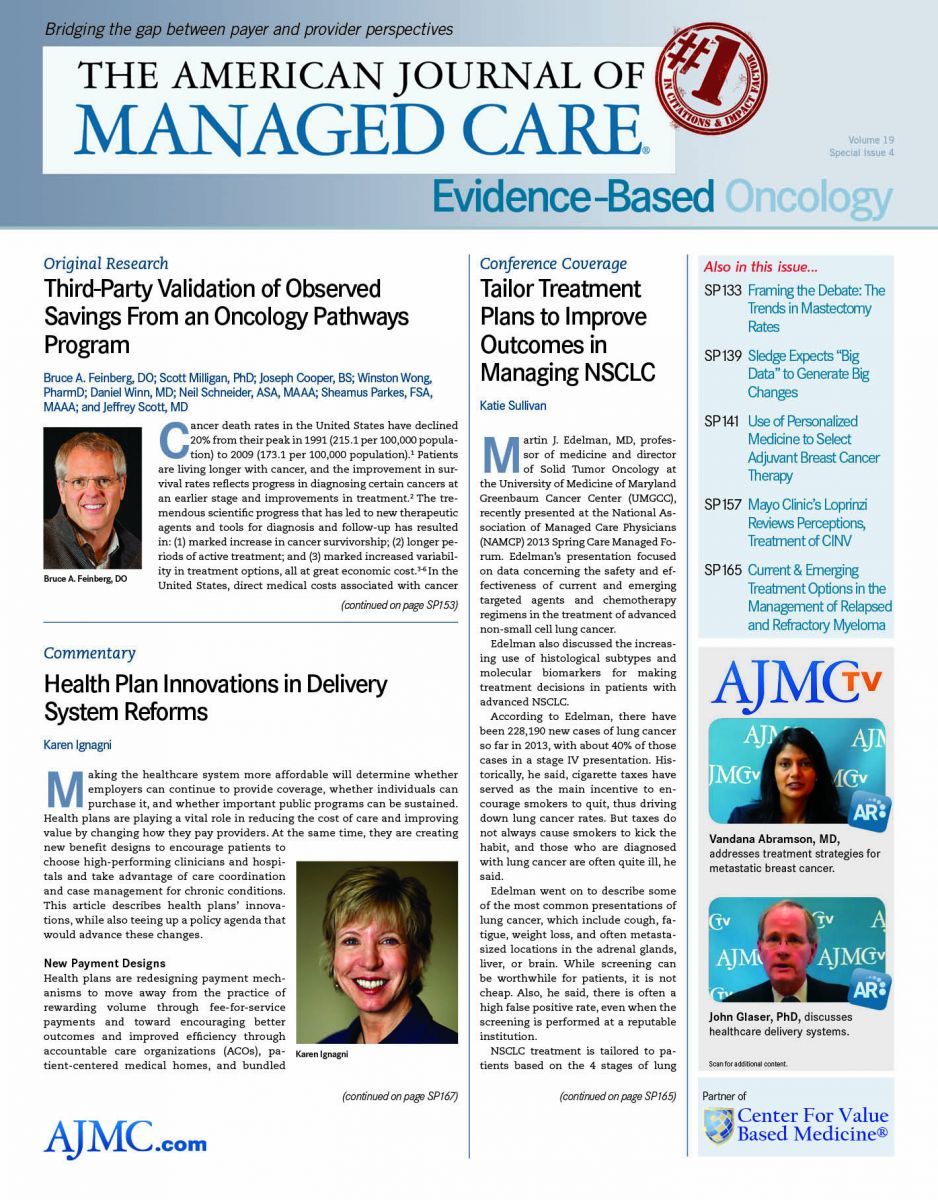- Center on Health Equity & Access
- Clinical
- Health Care Cost
- Health Care Delivery
- Insurance
- Policy
- Technology
- Value-Based Care
Use of Personalized Medicine to Select Adjuvant Breast Cancer Therapy
Clinical trials are under way that may change the way risk of recurrence is assessed for early-stage breast cancer patients, allowing for individualization of therapy. In her presentation, at the 30th Annual Miami Breast Cancer Conference, Lisa A. Carey, MD, chief, Division of Hematology and Oncology, at the University of North Carolina Lineberger Comprehensive Cancer Center, highlighted the latest developments in the use of personalized adjuvant therapy and the evolving treatment paradigm.
Currently, clinicians assess both prognostic and predictive factors in choosing the type and duration of adjuvant therapy, taking into particular consideration menopausal status and type of breast cancer. Standard adjuvant therapy for women with hormone receptor-positive breast cancer is 5 years of tamoxifen. Postmenopausal women generally receive an aromatase inhibitor (AI) instead of tamoxifen, or sometimes after initial tamoxifen treatment.
However, the recent Adjuvant Tamoxifen, Longer Against Shorter (ATLAS) study demonstrated that longer treatment with tamoxifen resulted in lower risk of breast cancer recurrence and death from the disease. The trial randomized more than 6800 pre- and postmenopausal women who had been taking tamoxifen for 5 years for their estrogen receptor (ER)—positive breast cancer to treatment with either 5 more years of tamoxifen or placebo. “The improvement in survival for women taking tamoxifen for an additional 5 years was particularly late— not within the 5 years of the study itself, but after the patients had stopped their adjuvant therapy,” said Carey. During the second decade following diagnosis, women who had continued tamoxifen for 10 years had a 25% lower rate of recurrence and a 29% lower breast cancer mortality compared with women who were on treatment for a total of 5 years.
Adherence to therapy was not high in the trial: There was a 15% noncompliance rate for patients on year 7 of their adjuvant therapy, which rose to 40% by year 10.
“For ER-positive patients, there is a continuous risk of recurrence for about 1% to 2% of patients, unlike for ER-negative patients, who tend to have a point when the risk decreases to almost zero,” said Carey.
Long-term tamoxifen is not without side effects, but the benefits appeared to outweigh these risks. “There is a real risk of endometrial cancer, although the actual numbers are not high, and there is also a risk of blood clots,” said Carey. According to Carey, the main risk of blood clotting likely occurs early, which is why the risk was low in the long-term ATLAS study. However, tamoxifen therapy decreased the risk of ischemic heart disease and did not affect stroke outcomes.
The study is practice-changing for patients with stage I disease, according to Carey, and particularly relevant for premenopausal patients. Whether postmenopausal women should also receive 10 years of tamoxifen, rather than AI therapy, is now in question. There are currently no data comparing 5 years of AI to 10 years of tamoxifen.
Molecular Signatures
Other studies are assessing newly developed molecular signatures for use in identifying high-risk patients who would benefit from chemotherapy as part of their adjuvant regimen. The Trial Assigning Individualized Options for Treatment (Rx), or TAILORx, phase III study is addressing whether women with node-negative, ER-positive, earlystage breast cancer who have neither low- nor high-risk recurrence scores should receive chemotherapy in addition to adjuvant hormonal therapy. The Oncotype DX Breast Cancer Assay is being used to quantify a patient’s risk score based on expression levels of a panel of 21 genes. Oncotype Dx is commonly used in practice, Carey said, and patients with a high-risk score and node-negative disease are typically treated with chemotherapy and hormonal therapy.
The RxPONDER (Rx for Positive Node, Endocrine responsive Breast Cancer) trial is addressing how to use Oncotype Dx for chemotherapy decision making in patients with node-positive, ER-positive, HER2-negative disease, which may differ from node-positive and node-negative disease, said Carey.
Another test, MammaPrint, uses a 70 gene-expression profile to assess relapse risk in patients with breast cancer. The MINDACT phase III trial (Microarray in Node-Negative Disease May Avoid Chemotherapy) is under way to address how this expression signature compares with a common clinical-pathological criteria in selecting patients for adjuvant chemotherapy. “We are all waiting for really clear guidance to come from the MINDACT study,” said Carey.
For patients who have HER-positive breast cancer, chemotherapy is widely used as an adjuvant therapy in combination with trastuzumab. “For HERpositive disease, we currently don’t have any data on which women may not benefit from the additional chemotherapy,” said Carey. There is no genetic signature to test for, although researchers are attempting to identify potential prognostic biomarkers.


